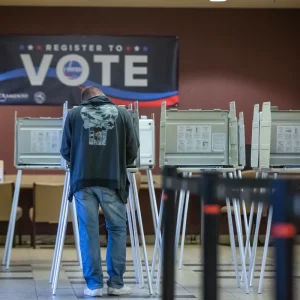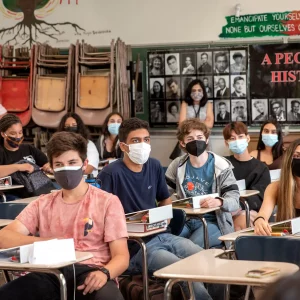
As the lights of University of Phoenix Stadium darken at the end of Super Bowl 49, health officials are waiting for fallout. Thousands of football enthusiasts traveled to Phoenix, Arizona the weekend of Super Bowl Sunday to share in the festivities. However, before their arrival, Arizona health officials were tracking over 1000 people who may have been exposed to the measles virus. Arizona has seven confirmed cases of measles spawning from the outbreak at Disneyland in Southern California last December. These seven cases, and the mass pilgrimage of sports aficionados that passed through the state, have left members of the Centers for Disease Control and Prevention (CDC) very concerned. Dr. Anne Schuchat, the Director of the CDC’s National Center for Immunization and Respiratory Diseases, stated that “the very large outbreaks we’ve seen around the world often started with a small number of cases.” Her point is applicable to a virus like measles where 90% of those not immunized who come in contact with an individual infected with the virus will also contract the disease. In order to put that contagion rate in perspective, someone infected with measles may infect 12 to 18 additional individuals. People contagious with the measles will not experience or show symptoms for the first three to four days, which only increases the risk of exposure. So what exactly is a measles virus? The outbreak has caused many Americans to ask this questions because we have gone an entire generation since the virus was deemed eliminated in the United States in 2000.
According to the CDC, “measles is a highly contagious respiratory disease caused by a virus. It spreads through the air via coughing and sneezing. Measles starts with a fever, runny nose, cough, red eyes, and sore throat, and is followed by a rash that spreads all over the body.” The agency says that approximately 30 percent of cases will experience various complications associated with the virus. Common complications include ear infections and diarrhea. However, patients will occasionally suffer from more serious complications such as pneumonia or encephalitis, the swelling of the brain. It is the latter two complications that have doctors worried because they occur most often in children under five or adults over 20, and deaths resulting from measles are predominantly caused by these types of complications.
From January 1 to January 30, 102 people from 14 states were reported to have measles. On January 28 there were only 84 confirmed cases, which shows how quickly this virus spreads. Last year there were 644 confirmed cases of measles and the 102 cases this January is the highest number of confirmed cases in one month since the year 2000. You may wonder how the revival of a virus considered eliminated could be so severe, or even possible. The answer has public health officials enraged.
The problem isn’t the vaccine failing to work, because the two scheduled doses of the measles, mumps and rubella vaccines (MMR ) are more than 99% effective in preventing measles. The problem is largely a product from the discredited study by former medical researcher and surgeon Andrew Wakefield. In 1998, Wakefield published a study that asserted the MMR vaccine distributed to children 12 to 15 months of age induced toxins that caused autism. The study and subsequent debate has rocked the public health world, creating a loyal and almost cult like following of “anti-vaxxers.” J. B. Handley is the co-founder of Generation Rescue, a group that disputes vaccine safety and has compared Wakefield to “Nelson Mandela and Jesus Christ rolled into one.” However, his following continues to deny the numerous proofs that Wakefield’s study was not only flawed, but as the British Medical Journal writes, an “elaborate fraud.” The study reported faulty timelines to fabricate causality between the reception of a vaccine and the development of autism. Furthermore, it only examined 12 children and was later found to be funded by lawyers who were mounting a case against vaccine manufacturers. The studies that have followed Wakefield’s have not only failed to replicate his findings but have also concluded no link exists between MMR and autism.
So why such dedication on behalf of the “anti-vaxxers” if it is nothing more than a fraudulent lie? The population is largely comprised of two general demographics. The first are often upper middle-class, politically liberal parents afraid that vaccination is an “unnatural” way of strengthening their child’s immune system. The second are parents desperate for an answer to a disease that has no smoking gun as the cause. Wakefield’s study erases the uncertainty for troubled parents, and gives them something to believe in. This false reality however may come at a cost.
So where does the Golden State fit into all this? California hosts the largest population of vaccination deniers in the United States, so it’s no mystery as to why the outbreak began at a Californian amusement park that attracts millions every year. Is it right for parents to opt out of vaccinating their children based on “personal belief” when the majority of that belief is based on false information? We may wistfully say “yes” because supposedly only those who choose against immunization are at risk. However, measles virus can infect those who have been vaccinated, especially if they have relatively weak immune systems. The strength of an individual’s immune system varies through life. Those who would be at risk because of common decreases in immunity include, but are not limited to: pregnant women, children, the elderly, and cancer patients whose immunity has been wiped out by chemotherapy. Some would go as far to say the decision to not vaccinate is criminal.
Arthur Caplan, a prominent bioethicist at NYU, and an expert on vaccine policy says by choosing to not vaccinate your child, it makes them a direct threat to the health and wellbeing of children, who are vaccinated. Caplan compares not vaccinating children to drunk driving. People are allowed to choose how and when they drink alcohol; however, the consequences of their consumption could cause harm to others. Just as the state has made legal consequences for drunk drivers because of their potential to harm others, it is in the state’s interest to improve vaccination regulations in order to mitigate outbreaks. Caplan thinks parents who choose to not vaccinate make their child a potential contagion source should face legal prosecution.

Though there is no law making it illegal to not vaccinate your children, two California state senators have proposed a bill that might make vaccination unavoidable. Senators Richard Pan of Sacramento and Ben Allen of Santa Monica are sponsoring a new bill that would eliminate parents’ ability to seek a personal-belief exemption. That means all children would have to be vaccinated to enroll in school unless they have a medical condition preventing it. Similarly the University of California system will begin requiring students to be screened for tuberculosis and vaccinated for measles, mumps, rubella, chicken pox, meningococcus, tetanus and whooping cough by 2017. Currently the UC system only requires students to be vaccinated for hepatitis B. Some are worried that vaccination requirements are too strict a measure for the state to be taking. That it would allow them too large a role in people’s personal lives. However, what should the state do? Is it not the first priority of the government to protect the welfare of its constituent citizens? We have the technology to render obsolete a disease that until fairly recently infected millions every year. Government must create mechanisms that make the costs of not vaccinating large enough to be followed, and with children the most susceptible to the disease the policy should focus on schools. California is one of 20 states that have the personal-belief exemption. It is this option that has allowed false beliefs to remain unquestioned and eliminated diseases to re-occur in a nation with premier medical institutions, and public health securities.
As the debate around vaccination choice becomes more partisan, predominant Republicans like Chris Christie and Rand Paul should look to the words of Ronald Reagan who said, “government’s first duty is to protect the people.” Public health is no exception.



